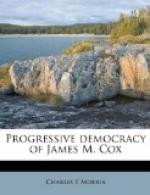“The details of these instances, which might be greatly expanded, have been touched in order to form a setting as for a picture. Our view is toward to-morrow. The opposition, and I assume that they are sincere in it, stands in the skyline of the setting sun, looking backward, backward to the old days of reaction.”
CHAPTER IV
Cox and the league—“I favor going in”
“And I do earnestly urge that all the people of this great and enlightened state assemble at their respective places of worship and invoke Almighty God to enlighten the Rulers of the world to the end that they may see the folly of war and speedily terminate it; that in our homes and about our hearthstones we implore the Divine Spirit in behalf of the people of the stricken nations, whose miseries are beyond our comprehension— people who have been plunged into the depths of war through no fault of their own.
“And I do further recommend and urge that in all the schools of the State of Ohio the afternoon of Friday, October 2nd, 1914, be set aside for exercises, having for their purpose to instill into the minds of children and into their hearts the great blessing that will come to them and to the world when war is no more.”
The quoted sentences from Governor Cox’s proclamation for a day of prayer on October 4, 1914, a period at which the horrors of the great world war had but begun, disclose that Governor Cox is not a recent convert to the central thought and purpose of the conception of the League of Nations.
Through the numerous official proclamations and the many addresses which he made during the period of the war the central thought repeatedly emphasized was that the fruit of war must be an everlasting peace. In accordance with the proclamation of the President, establishing June 5, 1917, as the “call-to-the-colors” day of the young men of the Country, the Governor said:
“It is probably the most trying hour the world has ever known, and the policies of government, purified and preserved by those who live now, will determine the civilization under which our children and our children’s children shall live in the future. What greater guarantee of their peace and happiness can be given them than a democracy that envelops all nations—a democracy sanctified by an endearing memory of what was unselfishly given to make it possible?”
In his proclamation calling for a State convention to perfect the organization of an Ohio branch of the League to Enforce Peace, the Governor emphasized as the second of its objects “to keep the world safe by a League of Nations,” and he said that the purpose of the organization would be “to confirm opposition to a premature peace and sustain the determination of our people to fight until Prussian militarism is destroyed and the way may be open for securing permanent peace by a League of Nations.” When hostilities were concluded Governor Cox had the faith that “this peace brings the dawn of a new day of consecration,” and in his official proclamation he said: “A world is reborn. Our Nation has brought success to a righteous cause. Our State has given with full heart to the achievement of the glorious end.”




